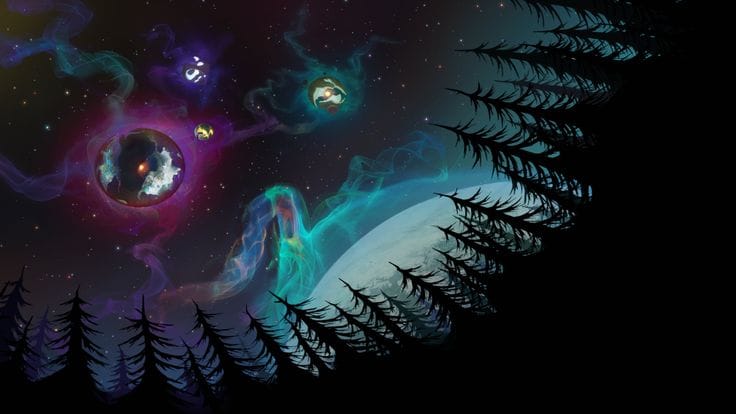Why “The Outer Wilds” is the best science fiction game ever made

The Outer Wilds is an open-world game about flying a spaceship around a galaxy packed with lots of stuff to discover. That means it’s a game about discovery, which means that anything you learn about the game itself outside of playing it, constitutes a spoiler.
The Outer Wilds is a game about science. About doing real science. Not about “Science” as a body of knowledge that we just sit on top of. That, the capital-S “Science” is the result of a process that often gets overlooked when people talk about “science.” That being, the very real stories of the very real people who went through some very real circumstances to give us that knowledge. People who were willing to go through harrowing and difficult challenges that may have seemed impossible to them. And may have been impossible indeed. But to find out, someone had to try. And that person may have had to give their life for the rest of us to have that knowledge. This is a bold and noble pursuit that must be given the greatest possible honor. For it is these people, these giants, atop whose shoulders our civilization is built.
Scientific knowledge doesn’t just come from nowhere. It comes from people who notice something weird and investigate it. You put the pieces together and figure out what’s going on, and then you figure out what you can do. And then the cycle repeats itself on a larger scale.
In Outer Wilds, there are no power-ups and no weapons. No upgrades, no unlocks, nothing changes throughout the whole game, except your knowledge.
It’s a fictional world you have to do real science in
When you finally figure out how to get into that locked room, it wasn’t because you finally unlocked the upgrade you needed to get to that area. It was because you figured out what you needed to know. This is why the game can only really be played once. When you first start off and don’t know anything, you fly around looking for stuff to discover. But after you’ve been playing for a dozen hours or so, and you’ve discovered where all the important stuff is, once you figure out what to do to “beat the game,” you can do it in like 8 minutes.
And it’s not like, “oh i finally found the blue key i was looking everywhere for.” It’s like, “oh, i just realized something about the fundamental nature of the game’s world, and i just thought of something to try, and if i’m right i might have just figured it out.”
It fosters a meaningful engagement with the game’s fiction. It made me excited about learning more about this game’s world, because it was quirky and interesting in fun little hidden mischievous ways.
Lots of games have this as part of their experience, and plenty manage to incorporate it into the gameplay, but no game has ever merged the two so completely. In Outer Wilds, the gameplay is exploration, the reward is the story, and the challenge is the exploration. You have to manage your suit’s oxygen supply and your jetpack fuel, your ship can take damage if you don’t fly carefully, there are a few dangerous places out there… but the penalty for death isn’t that bad, it just rewinds any progress you may have had getting somewhere difficult…
The part where I try to articulate the emotional effect this had on
I have been to the Quantum Moon in the Sixth Position and I have SEEN INTO the EYE of the UNIVERSE. I know what lies at the center of Giant’s Deep and I have SEEN what LURKs in the SHADOWS of DARK BRAMBLE.
Space is scary. There’s caves that fill up with sand, endless oceans with giant storms and a seemingly infinite maze of sharp weird plantlike things. Pretty much every area in this game caters to a different primal fear.
But there’s also, scattered around, just, guys. The other explorers who left before you, have all either landed or crash-landed and pretty much just set up camp wherever they are, and are just chilling. Hanging out playing their respective musical instrument and roughin it up in space. They just wanted to see what was out here.
So I haven’t mentioned the translator yet and that’s pretty much the game’s main tool that you use to discover things. You’re equipped with your people’s first ever Nomai translator which can translate all the ancient alien text scattered around your galaxy. So that’s your mission. To learn about the Nomai, learn what happened to them, etc..
The basic gameplay loop goes like this. You wake up, get in your spaceship and fly somewhere. Either pre-planned or just seeing where your thrusters take you. Then you land, hop out of your ship, and realize you’re suffocating because you forgot to put on your space suit. If you’re fast enough you can get back into your ship quick enough before you suffocate and die. You can put your spacesuit on and jump back out and go. Otherwise, you just have to wait a few seconds for the cycle to start over.
When you land in a new spot and find some Nomai writing, your translator automatically pops up and does its translation thing. You’ll read a bit of Nomai writing and it may teach you something, or it may not. Or it may not seem like it does. Depending on where you go first and what clues you find first, you can end up on a few different paths that ultimately lead back to each other, so you can discover everything on your own organic path. Including just picking a random direction to fly your ship in and seeing what you find. Or exploring based on what you find interesting. All are valid play styles.
What was that about science?
The game gives you a ship and a little museum full of your people’s established knowledge about your galaxy. You can and should use this knowledge in your travels, as you will build upon it as you go.
You are the first of your people to go to space with this translator. That is your significance in the game’s world. You are the first to discover what happened to the Nomai.
But that is just the goal of your mission. You also have obstacles. Various dangers that you have to learn to avoid by trial and error. Sometimes the path itself is hidden, and requires a thorough understanding of the world to find it. Like hidden passages that you have to be clever enough to find. Clues that you have to discover connections between. Ideas that connect together.
As I progressed through the game I went through various stages. Flying anywhere and everywhere to try to find anything, to discovering dense locations with lots of interesting things to find, to finding connections to other locations, and learning of the existence of other significant locations, etc. I was making progress in the game, even though nothing was changing. I hadn’t unlocked anything and the game world would start and play out the same every time i started, but as i learned more about the game world, i could use what i had learned to explore more effectively, because I had a better idea of where to look. Because I had found clues. Clues about where to look, that I had found, wandering around not knowing where to look.
This is how Outer Wilds is special. It’s a puzzle game that is both open ended and yet has one solution. It is a giant room with lots of hidden clues that all point to each other. It creates the feeling of meaningful discovery over and over again. The combination of the sense of danger with the optimism of discovery and just the content of the Nomai’s story itself is so well written and immersive.
wrapping up
I thought I had more coherent ideas about this when i decided to write this one, but i hope i’ve managed to paint some kind of picture of why i love this game without giving too much about it away. Maybe I’ll do a spoiler-full in-depth gush piece about it at some point. Let me know if that’s something you’d want to read.
